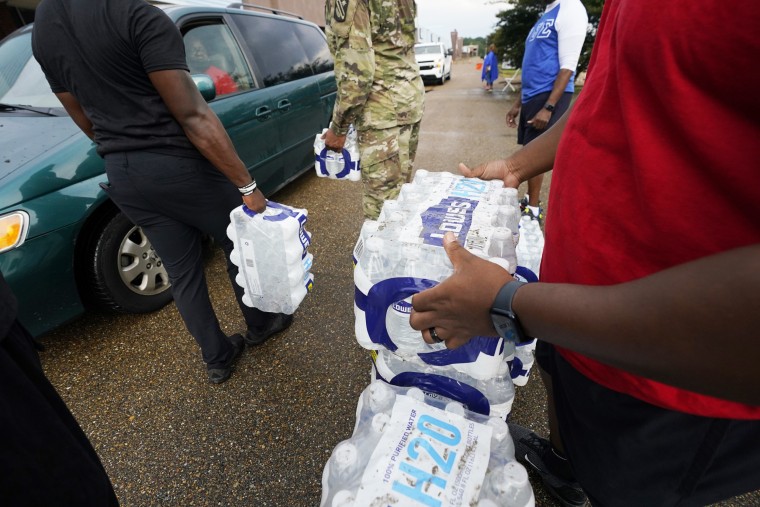A group of Jackson, Mississippi, residents filed a class-action lawsuit Friday over the water crisis that left over 150,000 people in the city without access to clean running water.
The suit is the first federal action that seeks class-action status to pursue damages "against various government and private engineering defendants" for the "neglect, mismanagement, and maintenance failures" that led to a complete shutdown of Jackson's water system last month, according to a news release.
The lawsuit names the city of Jackson, Mayor Chokwe Antar Lumumba, former Mayor Tony Yarber and former city public works directors, as well as private engineering companies, such as Siemens Corp. and Trilogy Engineering Services LLC, as defendants.
The lawsuit alleges that even before the water crisis left residents without running water for nearly seven weeks, "Jackson’s water supply was not fit for human consumption due to the high levels of lead and other contaminants," violating the plaintiffs' right to bodily integrity.
Jackson is the state capital and Mississippi's largest city, and 83% of its residents are Black.
"This public health crisis, decades in the making, was wholly foreseeable by Defendants’ actions and has left Jackson residents in an untenable position — without access to clean, safe water in 2022 in a major United States city," the lawsuit says.
The plaintiffs allege that as a result of the water crisis, they weren't able to "readily go about normal daily activities like using the bathroom, brushing [their] teeth, and cooking."
The four named plaintiffs claim they suffered loss of income and emotional distress because of the city’s contaminated water, with some experiencing "various health problems" from consuming it — including dehydration, malnutrition, lead poisoning, brain injuries, hair loss and skin rashes — according to the lawsuit.
One of the plaintiffs, Raine Becker, 44, has lived in Jackson for two years with her terminally ill 7-year-old son, Shylar. Shylar has a heart defect and liver disease that requires a feeding tube that has to be flushed with water, Becker told NBC News.
According to the lawsuit, children make up a quarter of Jackson’s residents and “are especially susceptible to the devastating and life-long damages of lead poisoning.”
"I didn’t have clean, sanitary water provided to me for my son," Becker said. "And if you think about how catastrophic that would be for a healthy person, you can think about how much more catastrophic it would be for an unhealthy person."
Becker said she didn't know about the city's water infrastructure issue until it made the news last month.
"It didn’t have to get to this point," she said. "They knew what was happening. They knew what the outcome was going to be, and they just waited for it to happen."
Lumumba's spokesperson, Melissa F. Payne, said the mayor's office had no comment, citing pending litigation.
Late last month, Lumumba told reporters the city had been dealing with the water crisis "for the better part of two years."
“I have said on multiple occasions that it’s a not a matter of if our system would fail, but a matter of when our system would fail," he said at the time.
Siemens Corp. also had no comment, citing pending litigation.
Yarber, the former mayor, and Trilogy Engineering Services LLC didn’t immediately respond to requests for comment.
An attorney for the plaintiffs, Mark Chalos, said the named defendants "were responsible for maintaining the water system" but "haven’t done what they were supposed to do."
"It’s absolutely a shame that a capital city, the most populous city in the state, in 2022 cannot provide safe, clean water to its residents," Chalos told NBC News. "There’s certainly plenty of blame to go around, and our investigation continues, and we’ll see where it leads."
Mississippi Gov. Tate Reeves declared a state of emergency late last month, saying the water crisis threatened “critical needs” after rain and flooding pushed the Pearl River to dangerous levels, according to officials. President Joe Biden approved an emergency declaration in the state on Aug. 30, freeing up federal resources to help manage the crisis.
“Until it is fixed, it means we do not have reliable running water at scale," Reeves said in a statement at the time. "It means the city cannot produce enough water to reliably flush toilets, fight fire and meet other critical needs."
Reeves announced last week that a boil-water advisory for the city had been lifted after nearly seven weeks of the water crisis, adding that clean water had been restored but that "the system is still imperfect."
“It is possible, although I pray not inevitable, that there will be further interruption," he said. "We cannot perfectly predict what will go wrong with such a broken system."
Chalos said officials' statements that the city's water is safe to drink haven’t necessarily won the trust of all residents.
"Many residents have lost trust in the leadership who are telling them that and are very skeptical of any proclamation from a government official that the water is now magically safe for them to drink," he said.
As well as unspecified compensatory and economic damages, the lawsuit seeks remediation that includes the removal of lead pipes, delivery of an adequate water supply to every home and an injunction preventing Jackson residents from paying for contaminated water.
A team from the Environmental Protection Agency’s inspector general’s office is conducting a top-to-bottom review of what caused the crisis.
The agency issued a lengthy report in 2020 outlining major shortfalls in the city's water system, which included a failure to replace lead pipes, faulty monitoring equipment and inadequate staffing.


